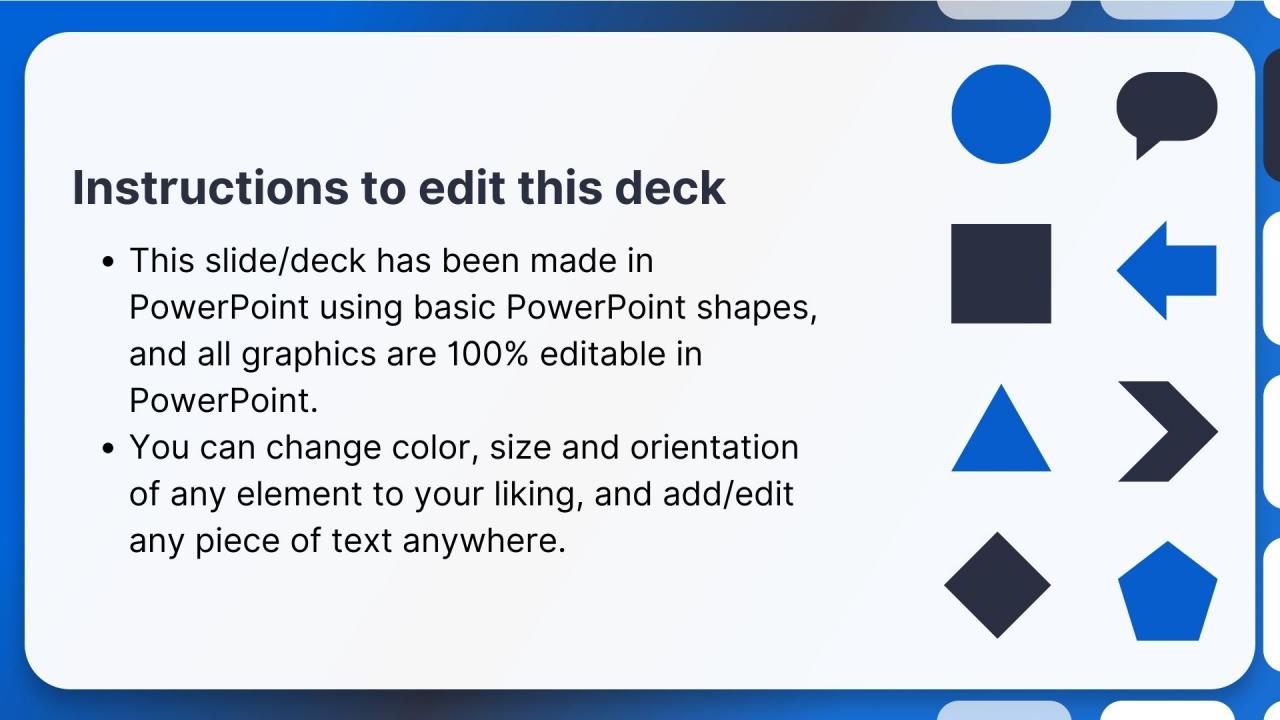Marketing In Age Of Artificial Intelligence Training Ppt
These slides give an overview of marketing in Artificial Intelligence. AI in marketing makes automated decisions based on data, analysis, and further consumer insights or economic trends that impact marketing strategies. AI can be used in email marketing, SEO and content marketing, voice and text-based marketing, and social media marketing.
You must be logged in to download this presentation.
 Impress your
Impress your audience
Editable
of Time
PowerPoint presentation slides
Presenting Marketing in Age of Artificial Intelligence. These slides are 100 percent made in PowerPoint and are compatible with all screen types and monitors. They also support Google Slides. Premium Customer Support available. Suitable for use by managers, employees, and organizations. These slides are easily customizable. You can edit the color, text, icon, and font size to suit your requirements.
People who downloaded this PowerPoint presentation also viewed the following :
Content of this Powerpoint Presentation
Slide 1
This slide gives an introduction to Artificial Intelligence in Marketing. AI in marketing makes automated decisions on the basis of data, analysis, and further consumer insights or economic trends that impact marketing strategies.
Instructor’s Notes: Today, marketers are using many AI tools to supplement marketing teams or to execute more tactical activities that require little human touch.
Slide 2
This slide highlights components of Artificial Intelligence in Marketing such as Machine Learning, Big Data and Analytics, and AI Platform Solutions.
Instructor’s Notes:
- Machine Learning: Machine Learning drives Artificial Intelligence, which entails computer algorithms that can study data and improve automatically over time. Machine Learning devices assess new data in the context of relevant historical data, making decisions based on history
- Big Data & Analytics: With the rise of digital media, there is a glut of data. This allows marketers to evaluate their efforts better and correctly allocate value across channels. Many marketers struggle to establish which data sets are worth gathering, resulting in accumulation of way too much data
- AI Platform Solutions: Effective AI-powered solutions give marketers a single platform to manage the massive amounts of data collected. These platforms may provide marketers with actionable marketing knowledge about their target audience, allowing them to make data-driven decisions about how to communicate with their potential customers. Frameworks like Bayesian Learning and Forgetting, for example, can assist marketers in better determining how receptive a customer is to a particular marketing attempt
Slide 3
This slide lists challenges that mark adoption of Artificial Intelligence in Marketing. These include privacy issues, training time & data quality, deployment practices, changing marketing landscape, and getting buy-ins.
Instructor’s Notes:
- Privacy: Consumers and government regulators are monitoring how businesses use personal data. Marketing teams must guarantee that they handle customer data ethically and follow relevant regulations or face severe penalties and handle bad press. When it comes to AI, this is a challenge. Unless the tools are specifically developed to follow specific legal requirements, they may violate guidelines what is allowed on how to using consumer data
- Training time & Data Quality: Artificial Intelligence tools do not immediately understand which actions to take to achieve marketing objectives. They will need time and training to study business goals, customer preferences, historical patterns, understand the whole context, and establish competence. This is not only time-consuming, but it also necessitates data quality assurances. If AI technologies are not educated on high-quality data that is reliable, timely, and representative, the tool will make suboptimal decisions that do not reflect user preferences, lowering the instrument's value
- Deployment Practices: Because AI is a relatively new marketing tool, concrete best practices have yet to emerge to guide marketing teams through their initial deployment
- Changing Marketing Landscape: With the advent of AI, marketing activities will be disrupted daily, and marketers must evaluate which positions will be eliminated and which created. According to one study, marketing technology will eventually replace nearly six out of ten existing marketing specialist and analyst roles
- Getting Management Buy-In: It can be tricky for marketing teams to convince business stakeholders of the value of AI investments. While Key Performance Indicators (KPIs) like ROI and efficiency are straightforward to measure, demonstrating how AI has enhanced customer experience or brand reputation is more complicated. With this perspective, marketing teams must ensure that they have the tools necessary to credit these qualitative advantages to AI investments
Slide 4
This slide showcases the advantages of Artificial Intelligence in Marketing. These benefits include real-time personalization, enhanced marketing management, faster decision making, and increased campaign ROI.
Instructor’s Notes:
- Real-Time Personalization: AI can help you send customized communications to customers at the ‘right’ times in their lives. AI may also assist marketers in identifying clients who are now disenchanted with a company and providing them information that will help change their mind and give the business another chance
- Enhanced Marketing Measurement: A lot of businesses fail to keep up with the volume of data generated through digital efforts, making it difficult to attribute success to specific campaigns. AI-powered dashboards provide a more comprehensive perspective of what's working, reproducing it across channels and allocating resources in the correct manner
- Faster Decision Making: AI can perform tactical data analysis faster than humans and use Machine Learning to make quick decisions based on campaign and customer context. This allows team members more time to focus on strategic projects, which can be used to inform AI-powered marketing. Marketers can leverage real-time information to make smarter marketing decisions with AI
Increased Campaign ROI: Marketers can use AI to alter their entire marketing campaign if they use it effectively, pulling the most useful insights from their databases and acting on these in real-time. AI tools can make quick decisions on how to spread expense across media channels or examine the most efficient ad placements to ensure that customers are consistently engaged, maximizing campaign value
Slide 5
This slide depicts the use of Artificial Intelligence in Digital Marketing. It can be used in email marketing, SEO & content marketing, voice & text-based marketing, and social media marketing.
Slide 6
This slide lists top Artificial Intelligence trends in Social Media Marketing. These are mobile testing and optimization, content testing and optimization, and behavioral data pattern and recognition.
Instructor’s Notes:
- Mobile Testing & Optimization: You may design individual ads targeted at users based on the type of device they use via Artificial Intelligence. For example, someone browsing for products and services on a mobile device will have less screen space but may be more tempted to buy. When your AI tool identifies that this prospect is on a mobile device, it will present them with a mobile-friendly ad that will entice them to take the next step
- Content Testing & Optimization: By targeting audiences with specific, relevant digital text and compelling imagery, AI-powered technologies have helped organizations increase conversion significantly. This means that marketers can now personalize social media marketing messages depending on a user's previous patterns of preferences and habits
- Behavioral Data Pattern & Recognition: AI in social media aims to improve customization and targeting by using data from previous customer journeys to estimate outcomes and build automated marketing content/workflows
Slide 7
This slide discusses the impact of Artificial Intelligence on Social Media Marketing. Some of the ways AI can accelerate marketing are image recognition, face recognition, text understanding, and social media management.
Instructor’s Notes:
- Image Recognition: Images are abundant on social media platforms. For larger firms, manually screening hundreds of images of each individual would be too taxing. Advanced AI technology can immediately scan a large number of photographs, evaluate and sort these as needed. Facebook uses Machine Learning to extract specific information from photographs, such as the appearance of objects, company logos, etc
- Face Recognition: In 2010, Facebook became the first social media platform to use face recognition to identify people in photographs. Since then, face recognition has gotten significantly more widespread and accurate. According to a 2019 report, the facial recognition business would produce $7 billion in sales by 2024. What's more impressive is that modern facial recognition software has progressed to the point where it can recognize emotions on a human face. The ability to identify customers' moods results in more targeted, relevant advertisements adapted to each customer's emotional state
- Text Understanding: Machine Learning algorithms use Natural Language Processing (NLP) to assess how you converse, engage with diverse information, and react to issues. Most social media networks make use of text-deciphering algorithms. Facebook has effectively filtered massive text-based data present on its platform and Instagram using a deep learning engine called DeepText
- Social Media Management: Artificial Intelligence has the most direct and imminent impact on social media management. The majority of companies now have a presence on social media platforms. This accomplishes two goals: It broadens the company's reach to its target market, and it complicates the social media management process. When it comes to scheduling and distributing social media material, AI has proven to be valuable. Sophisticated technologies evaluate post engagement, gather useful data from user comments, and provide strategic post recommendations.
Slide 8
This slide discusses the impact of AI on Social Media Marketing. Some of the ways AI can accelerate marketing are content creation & optimization, tracking online behavior, targeted advertising, and automated customer service.
Instructor’s Notes:
- Content Creation & Optimization: Creativity and good research capabilities are required for content development. While AI may lack the former, it more than makes up for it with the latter. AI can generate good content because of its capability to conduct exhaustive research in a short amount of time. AI-based techniques have also proved to be beneficial in terms of content optimization. AI can provide ideas on optimizing your content for search engines after analyzing top search results on a specific topic
- Tracking Online Behavior: AI's superpower is its ability to recognize and track trends. It may gather and give you vital information such as user browsing behaviors, average time on site, bounce rates, clicks, and views, among other things. Once you have all the numbers, it will be much easier to figure out why visitors leave, which aspects of your website or social media account are working, and which need to be improved
- Targeted Advertising: Advertising is one of the most prevalent applications of AI. You can adapt your marketing efforts and deliver them to the right audience by gaining access to the metadata containing relevant information about your clients' demographics and preferences. Artificial Intelligence and deep learning tools can aid in the monitoring of ad campaign performance and keeping up with particular market trends. AI also makes competitor research and analysis immensely easier and more effective
- Automated Customer Service: Many firms find it challenging to respond to every consumer query immediately. By automating customer service, clients can receive faster responses, and firms will win their customers' trust
Slide 9
This slide showcases how the use of AI is enhancing Email Marketing. Email Marketing is an essential aspect of Digital Marketing and AI has made it more potent with features such as personalisation, automation, and data analysis.
Instructor’s Notes: AI is critical in improving your email marketing methods to offer your email plan that gives better outcomes.
Slide 10
This slide depicts the positive effects of the usage of Artificial Intelligence in Email Marketing. There has been a perceptible improvement in revenue, click-through rates, open rates, and deliverability upon integrating AI with email components. AI can make sense of data better and faster than humans, making it a near-certainty that the industry will use it in the coming years.
Slide 11
This slide highlights industries on Email Marketing Open Rates. These industries include non-profit organizations, agriculture, forestry, government, healthcare, education, real estate, construction, advertising, logistics, engineering, and architecture.
Slide 12
This slide talks about the use of Artificial Intelligence to assist in Search Engine Optimization of a web page or website to gain better ranks and more traffic. AI can help with SERP analysis, content creation, optimization advice, etc.
Slide 13
This slide lists issues in SEO that AI can help with. These include automated keyword research, automatic content creation, increased traffic & site growth, automation of SEO workflows, voice search content discovery.
Instructor’s Notes: With the emergence of AI, digital marketers can now work with greater accuracy, speed, and precision while enhancing SEO accuracy. Marketers will be able to satisfy their clients' goals while also improving productivity by using AI-assisted content generation and optimization to swiftly get to the point of action.
Slide 14
This slide talks about the application of Artificial Intelligence and analytics based on voice content from phones and broadcasts in detecting financial crimes, better customer risk management, and reduces the cost of doing a business.
Instructor’s Notes: The overall cost of financial crime compliance, which includes unfavorable media screening, is expected to reach $180.9 billion by 2020.
Marketing In Age Of Artificial Intelligence Training Ppt with all 30 slides:
Use our Marketing In Age Of Artificial Intelligence Training Ppt to effectively help you save your valuable time. They are readymade to fit into any presentation structure.
-
“I required a slide for a board meeting and was so satisfied with the final result !! So much went into designing the slide and the communication was amazing! Can’t wait to have my next slide!”
-
Appreciate the research and its presentable format.




































































